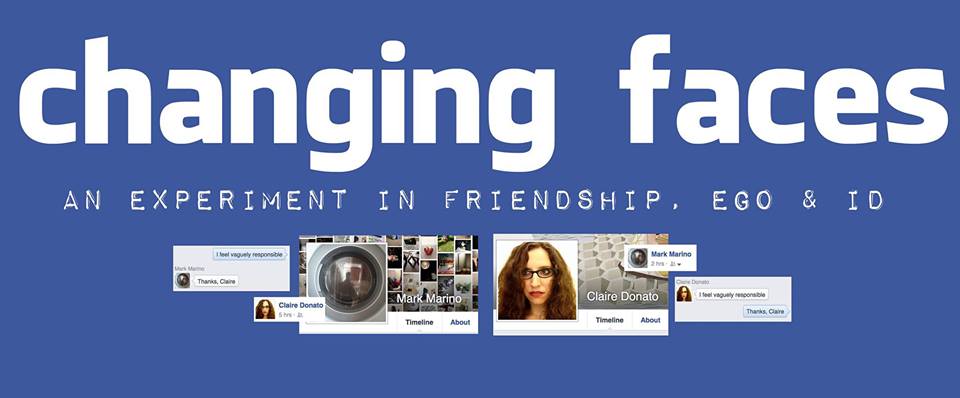Changing Faces: An Experiment in Friendship, Ego, and Id
During one week in the summer of 2015, poet Claire Donato and playwright Mark C. Marino embarked in a radical act of trust in our social media moment — they swapped social media accounts.
Claire became Mark and Mark Claire.
Or Clark and Maire, as it were.
During this week, in which Claire was visiting Mark’s current home of Los Angeles, the two began by doing what they would typically do — with perhaps some notable differences. Claire, for example, auditioned for a commercial while Mark began a journey to become a yoga instructor. Over time, the two would shift each other’s accounts. With Mark becoming more and more like Claire, and Claire, Mark.
Friends were bemused and befuddled, concerned and confused as the two began to break down their online identities in a realm where people believe what they see.
Atached are two archives, PDFs of the two accounts.
Claire Donato FB full Changing Facs
Mark Marino FB full Changing Faces
Artists Statement
Changing Faces: An Experiment in Friendship, Ego and ID
What would happen if you let someone else be you online for a week in a city where people routinely pretend to be someone they are not?
Changing Faces: An Experiment in Friendship, Ego and ID was a weeklong netprov duet by Claire Donato and Mark Marino (or Claire Marino and Mark Donato), two electronic artists who grew up in Pittsburgh, studied at Brown, and whose names end in O. Taking the ultimate leap of trust, they jumped into each other’s social media accounts from August 5-12, 2015. What they learned has something to teach us all about who we are online and how others make it so.
Apart from serving as one another’s administrative assistants (e.g., by relaying private messages to one another, taking responsibility for Liking one another’s family members’ photographs, performing other miscellaneous clerical tasks), Claire and Mark re-imagined one another’s lives in Los Angeles, meditating on the question of what it means to be someone you aren’t in a city where most people aren’t who they appear to be.
Violating Facebook’s Terms of Service, Mark undertook rigorous physical fitness routines and hot stone massages as Claire auditioned for commercials and wandered existentially around The Grove.
Apart from LA’s masks, the two were interested in the nature of friendship (what is it like to thumb a mile in a friend’s Likes), and concepts such as truth, loneliness, otherness, gender, and bar bets. Throughout the project, the two friends maintained an epistolary correspondence about the project in the form of emails and private chats.
As Jeff T. Johnson points out, in “Changing Faces: An Experiment in Friendship, Ego and ID,” friendship takes the place of and assumes the role of the superego. As children, our parents fill the role of internal authority until we self-manage; however, is it possible that we now manage each other, making sure we behave like ourselves on Facebook and elsewhere? As Jeff says, “When someone says ‘That’s not like you’ [with regard to the performance of one’s identity, whether on- or offline] we’re supposed to check ourselves.” That seems about right.
Changing Faces had three distinct stages. Stage I was “The Pass,” in which Claire and Mark attempted to pass themselves off as each other. Challenges here included capturing one another’s voices—Mark’s rhetoric tends to be more press release-y and plainspoken (he does publicity for the Electronic Literature Organization, after all), whereas Claire, who is unusually inactive on Facebook, engages a more lyrical/fragmentary voice occasionally punctuated by an ebullient promotional register. Stage II was “The Blur,” in which Claire and Mark blurred every possible line, hybridizing and conflating their lives, melding together their voices and metatheoretical frameworks. In Stage III, “The Switch,” our ‘provers became fully themselves in the other’s account, without making direct mention of this fact, so as to not get kicked off of Facebook.
Some questions arose with regard to ID (identity), not to mention id (primary impulses). What does it mean to live out your fantasies in someone else’s online identity? Alternatively, what does it mean to have someone live your fantasies out for you, or for your avatar? If your fantasies are actualized in a fictional world wherein you are a key player, does that make the fulfillment of your fantasies real? Does one need to draw a moral boundary when it comes to performing the actualization of fake fantasies in semi-public (or, on a publicly traded social network)? In other words, does performing a so-called fake self do harm to others? And is that self actually fake if it feels more real than a self IRL?

